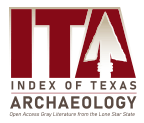Home > Research Projects and Centers > Center for Regional Heritage Research > Index of Texas Archaeology > Vol.
Agency
Texas Historical Commission
Abstract
Raba Kistner, Inc. (RKI), was contracted by the Fort Bend Independent School District (FBISD) (CLIENT) to conduct archaeological investigations for approximately 7.31-acres located near Arcola, Fort Bend County, Texas, that is proposed to be developed with a high school campus (Figure 1-1). In April 2019, RKI conducted an intensive pedestrian survey with shovel testing of approximately 80-acres immediately east, north, and south of the current 7.31-acre project area (Matthews and Ward 2019). The survey was conducted under Texas Antiquities Committee (TAC) Permit Number 8847 in advance of construction of the FBISD High School Campus #12 (Matthews and Ward 2019). After the completion of the 2019 investigations, the original location of the campus was revised and shifted north, south, and west, extending into 7.31-acres that was not previously surveyed (Figure 1-2). New investigations of the new 7.31-acres were undertaken to accommodate the shift in location of proposed FBISD Campus #12; the results of this survey are detailed in this report. The 7.31-acre survey was conducted under TAC Permit Number 9359. The project took place on lands to be owned and controlled by the CLIENT, an entity of the State of Texas. As such, the project fell under the jurisdiction of the Antiquities Code of Texas (ACT) (Texas Natural Resource Code, Title 9, Chapter 191), which is administered by the Texas Historical Commission (THC).
The investigations included a background review and a pedestrian survey augmented by shovel testing. The background review revealed that no archaeological sites had been previously recorded within the Area of Potential Effects (APE). RKI conducted an intensive pedestrian survey with shovel testing in an effort to locate cultural deposits. A total of sixteen shovel tests were attempted within the approximately 7.31-acre APE, one of which could not be completed due to dense vegetation and water covering the ground surface. All shovel tests were negative for cultural materials. Disturbances were observed throughout the APE, predominately from the construction of irrigation/drainage canals, roads, and agricultural practice.
RKI has made a good faith effort to identify cultural resources within the APE. No significant deposits or features were identified during the intensive pedestrian survey. As a result, RKI does not recommend further archaeological investigations within the APE. However, should changes be made to the project APE, further work may be required. All field records and photographs produced during investigations will be permanently house at the Center for Archaeological Research at the University of Texas at San Antonio.
Creative Commons License

This work is licensed under a Creative Commons Attribution-NonCommercial 4.0 International License
Included in
American Material Culture Commons, Archaeological Anthropology Commons, Environmental Studies Commons, Other American Studies Commons, Other Arts and Humanities Commons, Other History of Art, Architecture, and Archaeology Commons, United States History Commons
Submission Location
Tell us how this article helped you.


